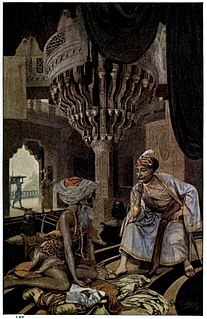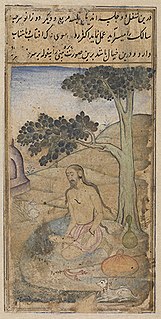Related Research Articles

Sufism, also known as Tasawwuf, is mysticism in Islam, "characterized ... [by particular] values, ritual practices, doctrines and institutions". It is variously defined as "Islamic mysticism", "the inward dimension of Islam" or "the phenomenon of mysticism within Islam",. Sufism began very early in Islamic history and represents "the main manifestation and the most important and central crystallization of" mystical practice in Islam. Practitioners of Sufism have been referred to as "Sufis".

A fakir, faqeer or faqir, derived from faqr is an Islamic term traditionally used for a Sufi Muslim whose contingency and utter dependence upon God is manifest in everything they do and every breath they take. They do not necessarily renounce all relationships and take a vow of poverty, some may be poor and some may even be wealthy, but the adornments of the temporal worldly life are kept in perspective and do not detract from their constant neediness of God. The connotations of poverty associated with the term relate to their spiritual neediness, not necessarily their physical neediness. The faqir seeks to attain the condition of the perfect slave of Allah, who "delivers his trust (existence) back to its Owner." They are said to be "faqir ila Allah" or impoverished in comparison to Allah, which is the most exalted state to attain.

Al-Hallaj or Mansour Hallaj was a Persian mystic, poet and teacher of Sufism. He is best known for his saying: "I am the Truth" (Ana'l-Ḥaqq), which many saw as a claim to divinity, while others interpreted it as an instance of annihilation of the ego which allows God to speak through the individual. Al-Hallaj gained a wide following as a preacher before he became implicated in power struggles of the Abbasid court and was executed after a long period of confinement on religious and political charges. Although most of his Sufi contemporaries disapproved of his actions, Hallaj later became a major figure in the Sufi tradition.

Abū Yazīd Ṭayfūr b. ʿĪsā b. Surūshān al-Bisṭāmī (al-Basṭāmī), commonly known in the Iranian world as Bāyazīd Bisṭāmī, was a Persian Sufi from north-central Iran. Known to future Sufis as Sultān-ul-Ārifīn, Bisṭāmī is considered to be one of the expositors of the state of fanā, the notion of dying in mystical union with Allah. Bastami was famous for "the boldness of his expression of the mystic’s complete absorption into the mysticism." Many "ecstatic utterances" have been attributed to Bisṭāmī, which lead to him being known as the "drunken" or "ecstatic" school of Islamic mysticism. Such utterance may be argued as, Bisṭāmī died with mystical union and the deity is speaking through his tongue. Bisṭāmī also claimed to have ascended through the seven heavens in his dream. His journey, known as the Mi'raj of Bisṭāmī, is clearly patterned on the Mi'raj of the Islamic prophet Muhammad. Bisṭāmī is characterized in three different ways: a free thinking radical, a pious Sufi who is deeply concerned with following the sha'ria and engaging in "devotions beyond the obligatory," and a pious individual who is presented as having a dream similar to the Mi'raj of Muhammed. The Mi'raj of Bisṭāmī seems as if Bisṭāmī is going through a self journey; as he ascends through each heaven, Bisṭāmī is gaining knowledge in how he communicates with the angels and the number of angels he encounters increases.
Najm ad-Dīn Kubrà was a 13th-century Khwarezmian Sufi from Khwarezm and the founder of the Kubrawiya, influential in the Ilkhanate and Timurid dynasty. His method, exemplary of a "golden age" of Sufi metaphysics, was related to the Illuminationism of Shahab al-Din Yahya ibn Habash Suhrawardi as well as to Rumi's Shams Tabrizi. Kubra was born in 540/1145 and died in 618/1221.
Henry Corbin was a philosopher, theologian, Iranologist and professor of Islamic Studies at the École pratique des hautes études in Paris, France.
Sufism is the mystical branch of Islam. A Sufi is a Muslim who seeks annihilation of the ego in God.
Sufi philosophy includes the schools of thought unique to Sufism, a mystical branch within Islam, also termed as Tasawwuf or Faqr according to its adherents. Sufism and its philosophical traditions may be associated with both Sunni Islam and Shia Islam. It has been suggested that Sufi thought emerged from the Middle East in the eighth century, but adherents are now found around the world. According to Sufism, it is a part of the Islamic teaching that deals with the purification of inner self and is the way which removes all the veils between divine and man. It was around 1000 CE that early Sufi literature, in the form of manuals, treatises, discourses and poetry, became the source of Sufi thinking and meditations. Sufi philosophy, like all other major philosophical traditions, has several sub-branches including metaphysics and cosmology as well as several unique concepts.

Abu Muhammad Sheikh Ruzbehan Baqli (1128–1209) was a Persian poet, mystic, teacher and sufi master. He wrote about his own life as well as published commentaries on Sufi poets and ideas.

Carl W. Ernst is the Kenan Distinguished Professor of Islamic studies at the Department of Religious Studies at the University of North Carolina at Chapel Hill. He is also the director of the Carolina Center for the Study of the Middle East and Muslim Civilizations.
Omid Safi is an American Professor of Asian and Middle Eastern Studies at Duke University. He served as the Director of Duke Islamic Studies Center from July 2014 to June 2019 and was a columnist for On Being. Dr. Safi specializes in Islamic mysticism (Sufism), contemporary Islamic thought and medieval Islamic history. He has served on the board of the Pluralism project at Harvard University and served as the co-chair of the steering committee for the Study of Islam and the Islamic Mysticism Group at the American Academy of Religion. Before joining Duke University, Dr. Safi was a professor at the University of North Carolina Chapel Hill. Prior to joining the University of North Carolina at Chapel Hill, he was on faculty at Colgate University as an Assistant Professor of Philosophy and Religion from 1999 - 2004.
Devin Deweese is a professor of Islamic and Central Eurasian Studies at Indiana University, Bloomington.

Muhammad GhawthGwaliyari (1500–1562) was a 16th-century Sufi master of the Shattari order and Sufi saint, a musician, and the author of Jawahir-i Khams.
Dr. Shafique N. Virani is Distinguished Professor of Islamic Studies at the University of Toronto, founding Director of the Centre for South Asian Civilizations, and past chair of the Department of Historical Studies. He was previously on the faculty of Harvard University in the Department of Sanskrit and Indian Studies and the Head of World Humanities at Zayed University in the United Arab Emirates. After earning a joint honors degree with distinction in Religious Studies and Middle East Studies and a master's degree in Islamic Studies at McGill University in Montréal, he completed an AM and PhD at Harvard University in Near Eastern Languages and Civilizations. He is an award-winning author and internationally recognized public speaker who has addressed people from over 50 countries and audiences of over 15,000. Describing him as “a visionary,” the United Nations honored him for dedicating his efforts “to the cause of extending the frontiers of knowledge and the welfare of humankind.”
Ahmed Ibn Abu al-Hussain al-Nuri, known also as Nuri, was a famous early Sufi saint. He was of Persian origins, but born in Baghdad in 840 CE where spent most of his life. He is the author of Maqamat al-qulub. He is famous for saying, "I love God and God loves me". He is one of the earliest Sufis who was clearly mystical as illustrated by his saying "Joining with the Truth is parting from everything else, as parting with everything else is joining with it"
A shath, in the Islamic mystical tradition of Sufism, is an ecstatic utterance which may be outrageous in character. The word is derived from the root š-ṭ-ḥ, which carries the sense of overflowing or outpouring caused by agitation. Famous shathiyat include “Glory be to me, how great is my majesty” by Bayazid Bastami and “I am the Truth” by Mansur Al-Hallaj. Sufi authors sometimes claimed that such utterances were misquotations or attributed them to immaturity, madness, or intoxication. At other times they regarded them as authentic expressions of spiritual states, even profoundest experience of divine realities, which should not be manifested to the unworthy. Many Sufi authors, including al-Ghazali, showed ambivalence about apparently blasphemous nature of some shathiyat, while admiring the spiritual status of their authors.
Abu Muhammad Ruwaym bin Ahmad was an early Muslim jurist, aescetic, saint and reciter of the Qur'an. He was one of the second generation of practitioners of Sufism.
Hagiography is the literary genre of biographies about holy people. In Islamic Persia, hagiography developed as a genre during the eleventh century CE, in Khurāsān, a region from which many eastern Ṣūfīs came. It tended to focus on Sūfī saints. The tradition declined around the sixteenth to eighteenth centuries CE, but was revived in the nineteenth and still exists today online.

The Bahr al-Hayāt or Ocean of Life is an illustrated Persian book, published c. 1602 by Muhammad Ghawth, which covers topics including yoga asanas used for meditation. It is probably the first illustrated textbook of yoga.
Mohammad Hassan Faghfoory is an Iranian-American Islamic scholar and a professor of Islamic studies at the George Washington University in Washington, D.C..
References
- ↑ "Ruzbihan Baqli: Mystical Experience and the Rhetoric of Sainthood in Persian Sufism (1996) | Carl Ernst's Website". carlwernst.web.unc.edu.
- ↑ Seyed-Gohrab, Ali Asghar (2002). "Review of Ruzbihan Baqli: Mysticism and the Rhetoric of Sainthood in Persian Sufism". International Journal of Middle East Studies. 34 (2): 378–380. ISSN 0020-7438.
- ↑ "Ruzbihan Baqli: Mysticism and the Rhetoric of Sainthood in Persian Sufism". Routledge & CRC Press.